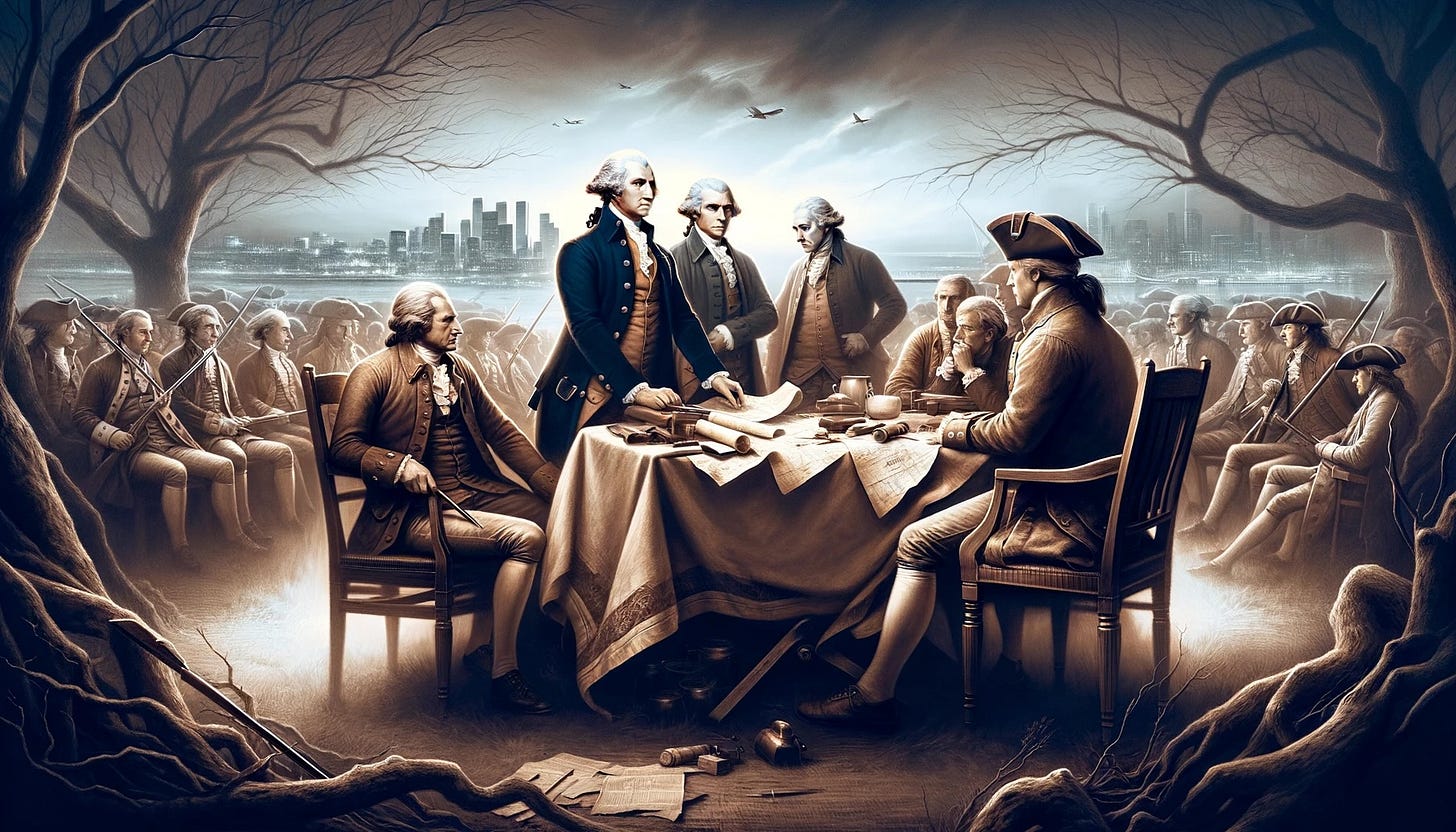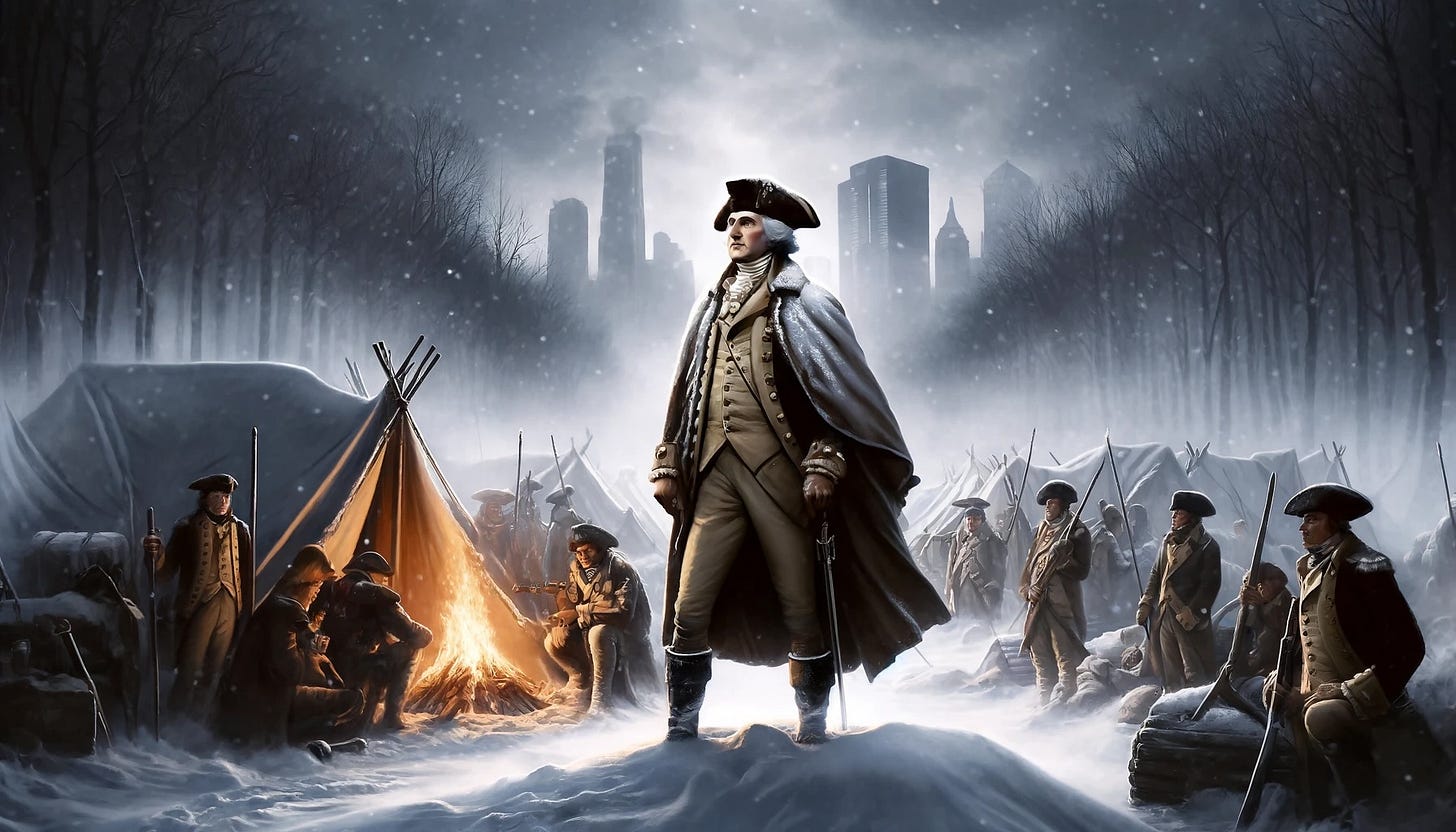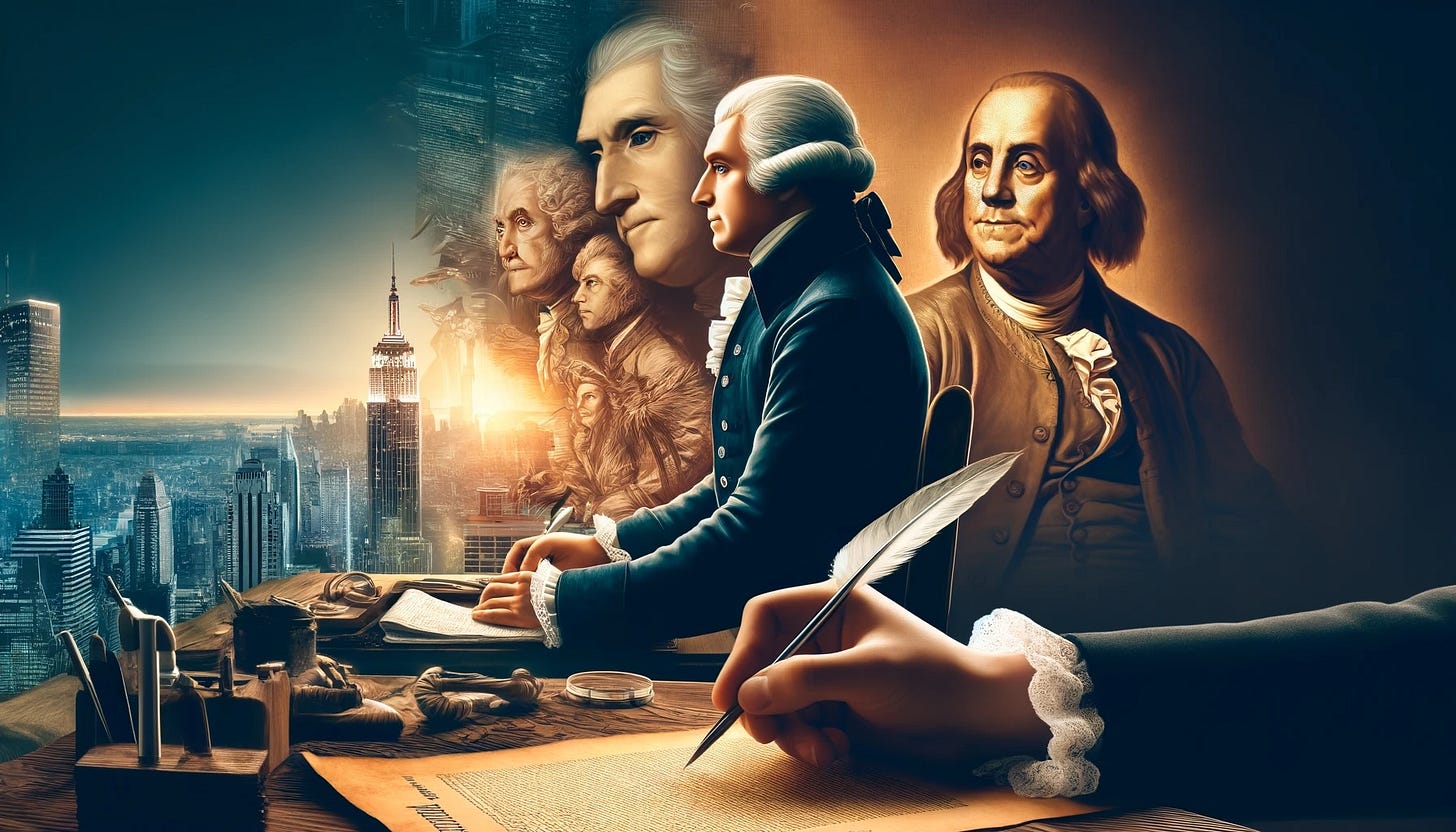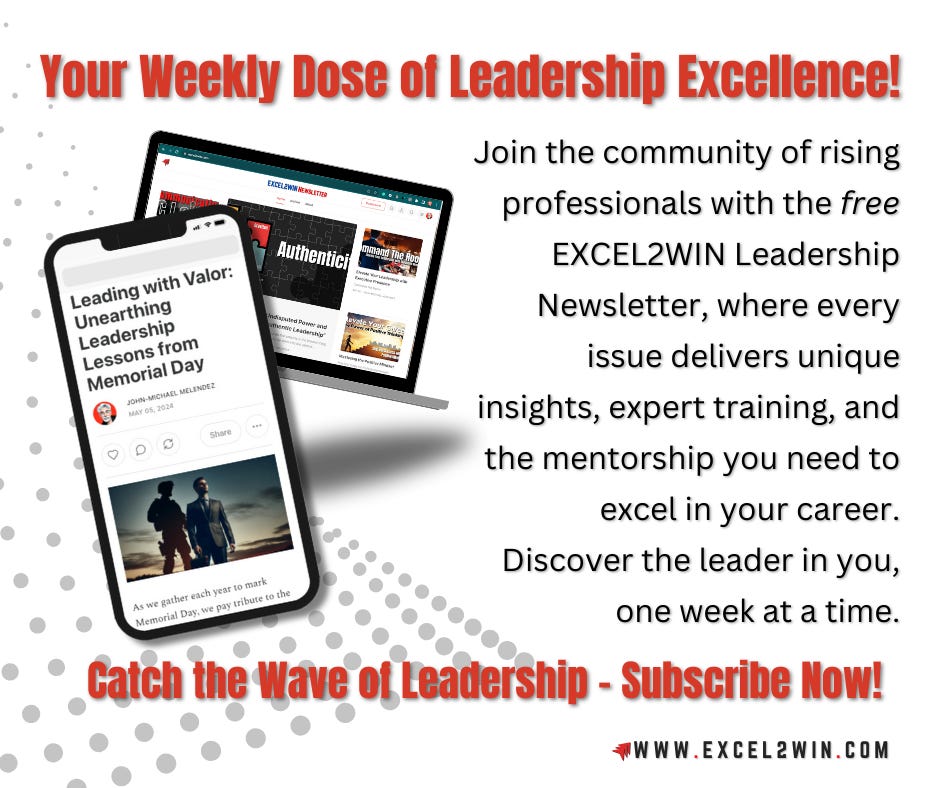Independence Day: Leadership Insights from the Birth of a Nation
As we approach the 4th of July, it's a perfect time to reflect on the leadership that forged our nation. The American Revolution wasn't just a fight for independence but a showcase of extraordinary leadership that provides timeless lessons for today's executives. By exploring the resilience and vision demonstrated by revolutionary leaders, we can find inspiration for our personal and professional growth.
While I may not be a historian scholar, I certainly paid attention in my high school history class. And from what I gather, history hasn't changed much since then. Just saying! wink
Setting the Scene
The American Revolution, a period of immense challenge and opportunity, is significantly relevant to the modern leadership landscape. Leaders such as George Washington, Thomas Jefferson, and Benjamin Franklin faced considerable difficulties confronting the British Empire. This scenario resonates with today's intricate and competitive business environment. Their ability to strategize, inspire, and persevere laid the groundwork for the United States, and their leadership principles continue to resonate in modern times.
The challenges faced by these leaders were not just military but also logistical and emotional. They had to rally a disparate group of colonies, each with its own interests and priorities, into a unified front against a well-equipped and experienced foe. This context provides a rich backdrop for understanding how their leadership principles can be applied today.
Resilience in Action
One of the most striking examples of resilience during the American Revolution is George Washington at Valley Forge. Facing brutal winters, lack of supplies, and plummeting troop morale, Washington's resilience kept the revolutionary cause alive. His steadfast leadership transformed a dire situation into a turning point.
Washington's ability to maintain morale and cohesion among his troops during such trying times is a testament to his resilience. He understood the importance of leading by example, maintaining a visible presence, and demonstrating unwavering commitment. For today's executives, resilience means staying focused and maintaining morale through tough times. It's about seeing obstacles as opportunities for growth and encouraging your team to do the same.
Modern executives can directly apply Washington's example by cultivating a mindset that views setbacks as temporary and solvable. Maintaining a positive outlook and communicating this to your team is crucial, ensuring they remain motivated and committed to the organization's goals despite challenges.
Visionary Leadership
Visionary leadership is about seeing beyond the immediate and crafting a compelling future. Thomas Jefferson's composition of the Declaration of Independence was more than just a political maneuver; it was a forward-thinking declaration that sparked a nation. Jefferson's ability to articulate the aspirations of the colonies in a way that resonated deeply with the population was a masterstroke of visionary leadership.
Visionary leaders in today's corporate world set clear, inspiring goals that align with their organization's values. They communicate this vision effectively, ensuring everyone is motivated by the bigger picture. Visionary leaders anticipate future trends and prepare their organizations to meet them head-on. Learning to articulate and drive a shared vision is essential for any leader aiming for lasting impact.
Benjamin Franklin's role in securing French support for the American cause also highlights visionary leadership. Understanding the strategic importance of international alliances, Franklin used his diplomatic skills to win crucial support. Modern leaders can draw inspiration from this by recognizing the importance of building strong networks and partnerships to achieve long-term goals.
Bringing History to Life
Applying the lessons from the American Revolution to modern leadership is not just a theoretical exercise but a practical and empowering process. Start by embracing adaptability and forward-thinking, just as the revolutionary leaders did. Learn from their experiences and adjust your strategies accordingly. Modern leaders must be willing to evolve, innovate, and stay open to new ideas, just as our revolutionary predecessors did.
Creating a solid team culture involves establishing an atmosphere where difficulties are seen as chances for growth. Encourage open communication and cultivate an environment where feedback is appreciated and put into action. Acknowledge and celebrate small achievements to generate momentum and sustain morale.
Maintaining a visionary approach requires leaders to be proactive rather than reactive. Set clear long-term goals and regularly review and adjust them based on changing circumstances. Motivate your team by showing them how their daily responsibilities align with the bigger picture, ensuring they grasp their efforts' impact on the organization's overall achievements.
Practical Tips for Modern Leaders
Embrace Continuous Learning: Modern leaders should commit to lifelong learning, and revolutionary leaders adapt their strategies based on experience. It is crucial to remain aware of industry developments, request input, and be open to modifying one's approach.
Build Strong Networks: Franklin's diplomatic success underscores the importance of alliances. Cultivate strong professional networks and seek collaborative opportunities to enhance your organization's capabilities.
Lead by Example: Washington's public dedication at Valley Forge showcases the effectiveness of leading through personal example. Exhibit the behaviors and attitudes that you anticipate from your team.
Communicate Clearly and Often: Jefferson's Declaration of Independence clearly articulated vision and purpose. Ensure your team understands the organization's goals and their role in achieving them.
Foster Resilience: Create a supportive environment where challenges are seen as opportunities for growth. **Promote the development of a resilient mindset within your team and ensure they have the essential resources to succeed.
Final thoughts
The resilience and visionary leadership displayed during the American Revolution were not just historical events but powerful demonstrations of what leaders can achieve. By adopting these characteristics, contemporary leaders can confidently and effectively maneuver through the intricacies of the business world and have a comparable influence in their own leadership positions. As we celebrate the 4th of July, let's honor the legacy of these revolutionary leaders by applying their lessons to our own leadership journeys.
Take a moment to reflect on your leadership style. Draw inspiration from history and commit to cultivating resilience and vision within your teams. To advance in your personal and leadership development journey, you can register for The EXCEL2WIN Leadership Newsletter. You will gain access to valuable insights, tips, and strategies to enhance your performance in all leadership roles.
“1776” by David McCullough
If you're looking for an inspiring read that delves into the heart of America's fight for independence, David McCullough's "1776" is a must-read. This riveting historical narrative transports you to a pivotal year in the American Revolution, capturing the drama, courage, and resilience that defined the era. McCullough masterfully chronicles the experiences of George Washington and his Continental Army, highlighting their indomitable spirit in the face of overwhelming odds.
"1776" offers a rich, detailed account of the strategic leadership and unwavering perseverance that led to the founding of the United States. Our article, "Revolutionary Resilience: Leadership Lessons from the American Revolution," precisely emphasizes these qualities as timeless lessons for modern leaders. Through McCullough's vivid storytelling, you'll understand how resilience and vision were crucial to overcoming the challenges of the time—principles that remain essential in today's leadership roles.
Engaging, uplifting, and meticulously researched, "1776" provides a history lesson and valuable insights for anyone looking to enhance their leadership skills. So, grab your copy of "1776" today and immerse yourself in a story that will motivate and inspire you. Remember to subscribe to The EXCEL2WIN Leadership Newsletter for more insights and strategies for excelling in your leadership journey.









